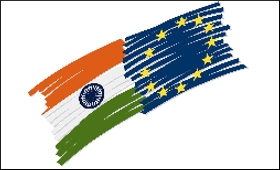Indian Govt. is mysteriously going ahead with negotiations on India-EU FTA without addressing contentious issues at home. It has to listen to and also resolve the doubts of stakeholders affected by it.
 Non-transparency
and insolence has perhaps become the nature of the current Govt. Seemingly, not
concerned with already ballooning trade deficit, India is likely to sign a
Free Trade Agreement with world’s biggest trade block European Union and that
too without any discussion with public in general and stakeholders in
particular. Assumptions based on leaked documents online are suggestive that the agreement is detrimental to indigenous agriculture, commodity and industrial segments like poultry, dairy, farm, fisheries, automobiles etc. and will further dampen India’s self-reliance.
Non-transparency
and insolence has perhaps become the nature of the current Govt. Seemingly, not
concerned with already ballooning trade deficit, India is likely to sign a
Free Trade Agreement with world’s biggest trade block European Union and that
too without any discussion with public in general and stakeholders in
particular. Assumptions based on leaked documents online are suggestive that the agreement is detrimental to indigenous agriculture, commodity and industrial segments like poultry, dairy, farm, fisheries, automobiles etc. and will further dampen India’s self-reliance.
Proposed
FTA with EU is the culmination of long-drawn negotiations on Bilateral Trade and
Investment Treaty which commenced in 2007. The modus operandi of going ahead
with this FTA is dubious as despite such a long time Govt. has not even clarified what benefit it would bring to India and how it will help maintain trade balance with EU when latter already has
low tariffs in most products while India’s average applied tariffs, even after
significant reductions, are 31.4% and 9.8% for agricultural and non
agricultural products respectively. In addition, close to 69 percent of India’s
agricultural exports and 65 percent of its non-agricultural export already
enter the European markets without duties, whereas EU allows only less than six
percent of the former's products without duty. Hence, the benefits of the pact
are ostensibly tilted towards this influential economic block who is trying to
seek even lower tariffs and easier flow of products in growing Indian market.
Another
apprehension is that it will hit Indian agro-industries and also marginal and small
farmers as agriculture in India is not as incentivized as it is there in Europe
where low production cost in itself is a protective barrier for domestic
companies while India is at a loss at this front. EU is not willing to address
this issue by contending that implicit subsidies are a multilateral issue
discussion on which can only be routed through WTO.
EU,
especially Germany is emphasizing the inclusion of automobiles in FTA which is
a major concern for automobile sector in India. Also, EU demands stricter
Intellectual Property regime intimidating generic drug manufactures in
India. Pact is also believed to grant it procurement in central and state level
institutions which would be extremely unfavorable for Indian Small and Medium
Enterprises (SMEs) who can in no way compete with advanced European companies. Foreign
companies might be allowed in technology-driven sectors but doing this for
regular contracts is certainly harmful for the growth of homeland companies.
This step would be an exclusive prerogative for EU as it hasn’t been accorded
to any other FTA partners till now.
The shroud secrecy with which Govt. is moving ahead with India-EU FTA pact is against the sound
democratic principles. Globally no Govt. can ratify bilateral trade agreements
on its own discretion but Indian Govt. is fearlessly and quite mysteriously going ahead with
negotiations with EU without addressing contentious issues at home. It is commendable
that Parliamentary panel has warned Govt. not to sign the pact before it being discussed with stakeholders. Govt. must disclose what commitments are being
made via FTA. It has to listen to and also resolve the apprehensions of interest groups affected by it.
No comments:
Post a Comment